重庆市北大附中重庆实验学校高三英语高考英语语法课件:名词与冠词
文档属性
| 名称 | 重庆市北大附中重庆实验学校高三英语高考英语语法课件:名词与冠词 |  | |
| 格式 | zip | ||
| 文件大小 | 344.8KB | ||
| 资源类型 | 教案 | ||
| 版本资源 | |||
| 科目 | 英语 | ||
| 更新时间 | 2012-05-29 10:45:40 | ||
图片预览



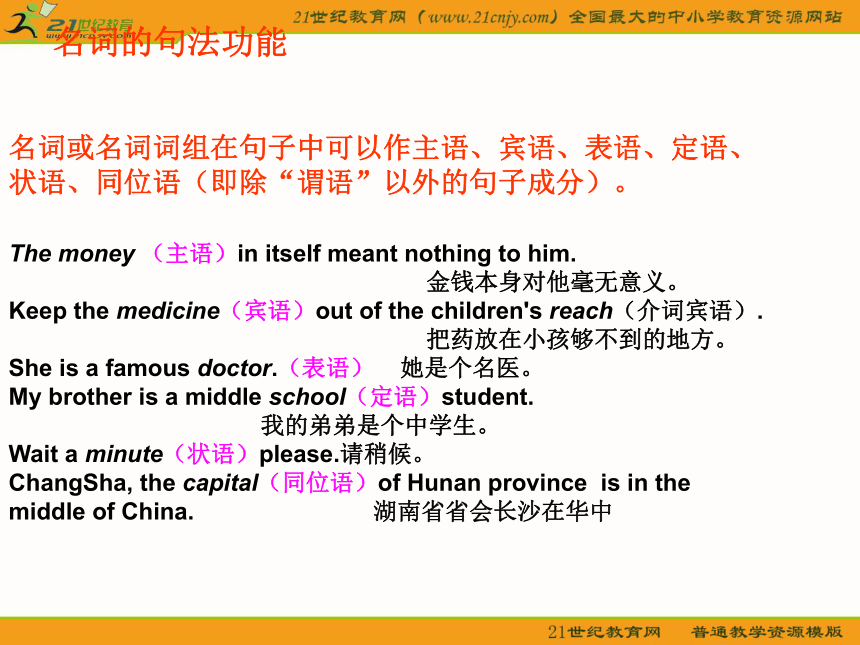
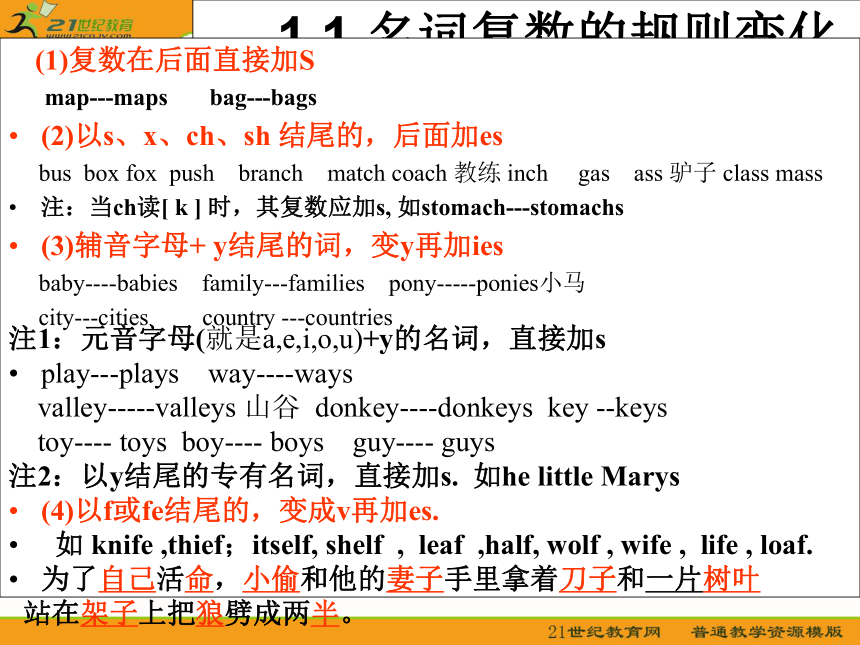

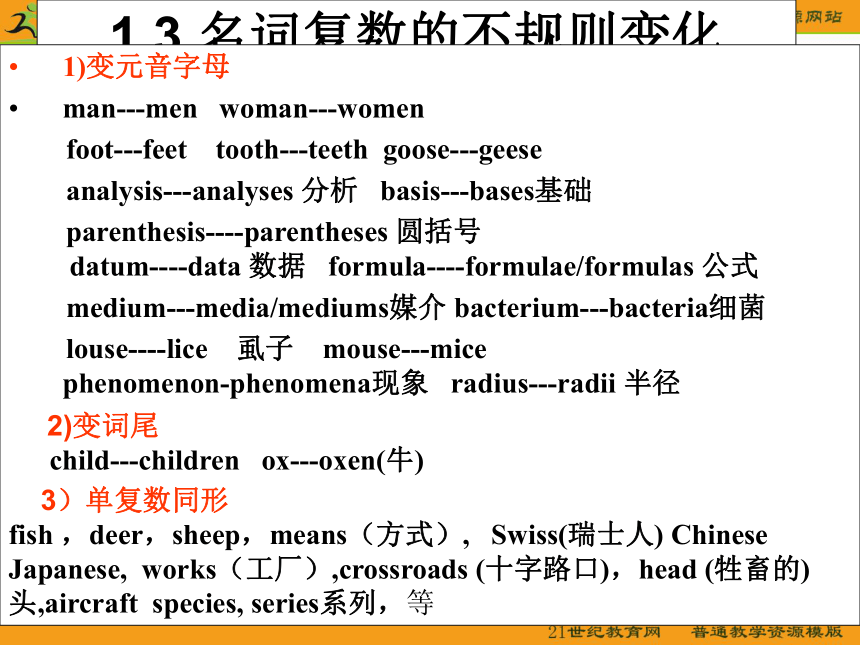
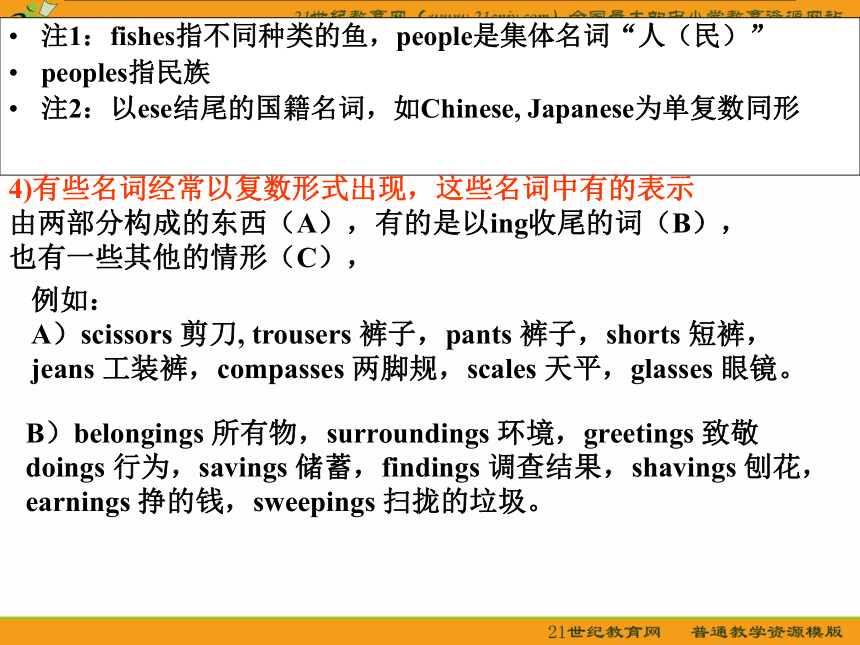
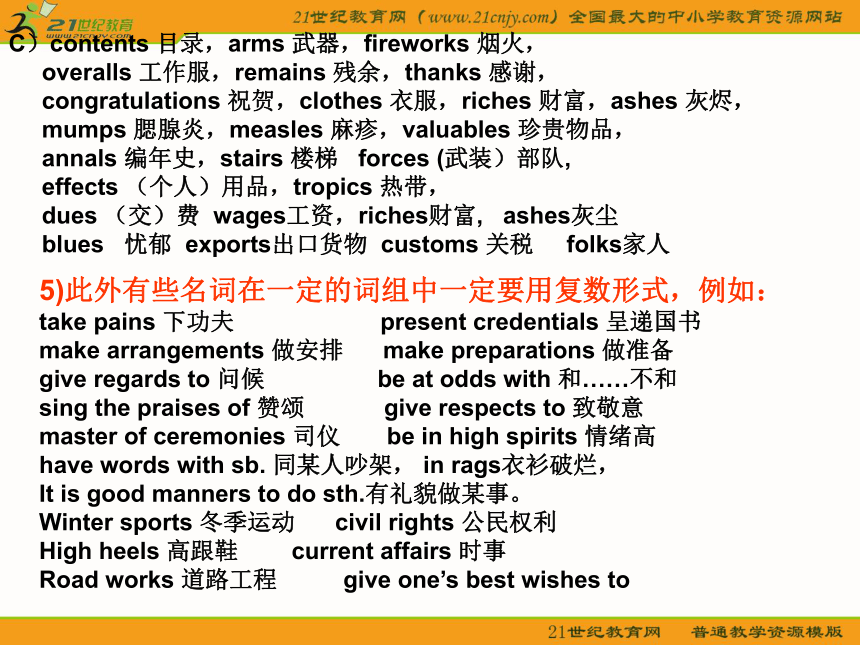
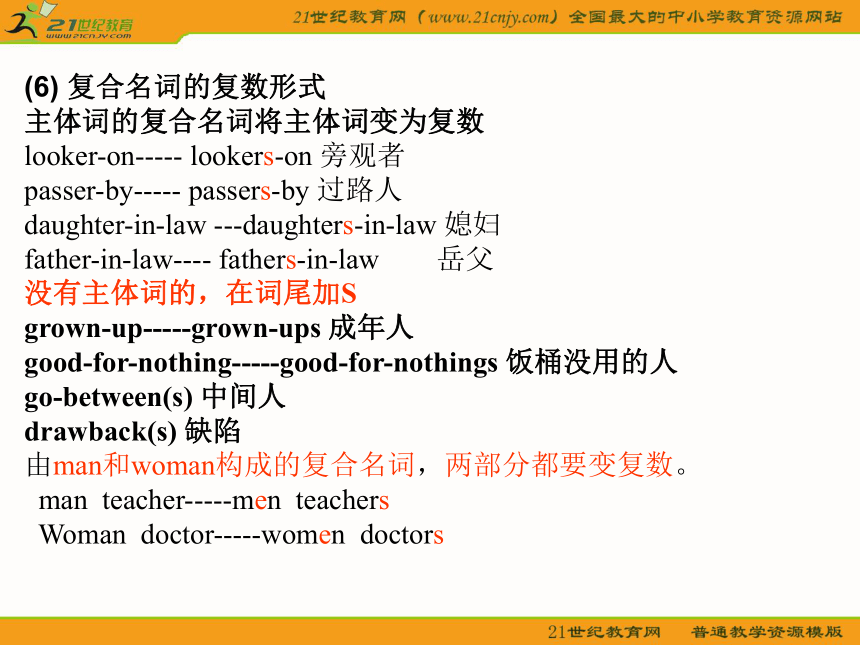
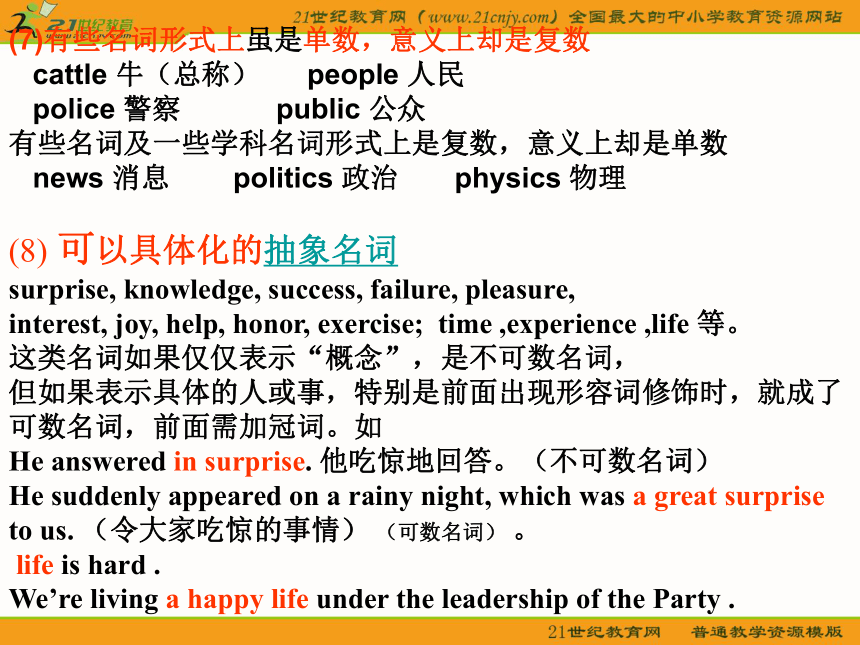
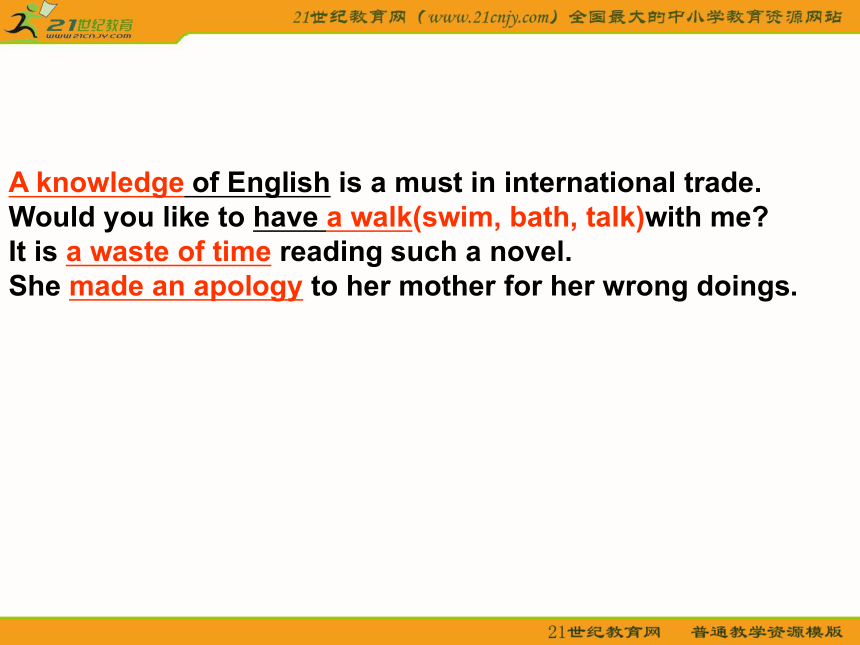
文档简介
(共70张PPT)
一.名词的分类:
个体名词:student
可数名词
普通名词 集体名词:people
名词
不可数名词 物质名词:water
专有名词:China
抽象名词:sorrow
名 词:表示人、事物、地点或抽象概念的名称的词
名 词:
可以用数目来计算的名词叫可数名词。可数名词一般有单数和复数两种形式(少数名词两种形式是相同的)。
可数名词:
不可数名词:
一般无法用数目来计算的名词叫不可数名词。不可数名词一般没有复数形式,并且不能用不定冠词a(an)或数词one修饰。物质/抽象/专有名词
名词或名词词组在句子中可以作主语、宾语、表语、定语、
状语、同位语(即除“谓语”以外的句子成分)。
名词的句法功能
The money (主语)in itself meant nothing to him.
金钱本身对他毫无意义。 Keep the medicine(宾语)out of the children's reach(介词宾语).
把药放在小孩够不到的地方。 She is a famous doctor.(表语) 她是个名医。 My brother is a middle school(定语)student.
我的弟弟是个中学生。
Wait a minute(状语)please.请稍候。 ChangSha, the capital(同位语)of Hunan province is in the
middle of China. 湖南省省会长沙在华中
1.1 名词复数的规则变化
(1)复数在后面直接加S
map---maps bag---bags
(2)以s、x、ch、sh 结尾的,后面加es
bus box fox push branch match coach 教练 inch gas ass 驴子 class mass
注:当ch读[ k ] 时,其复数应加s, 如stomach---stomachs
(3)辅音字母+ y结尾的词,变y再加ies
baby----babies family---families pony-----ponies小马
city---cities country ---countries
注1:元音字母(就是a,e,i,o,u)+y的名词,直接加s
play---plays way----ways
valley-----valleys 山谷 donkey----donkeys key --keys
toy---- toys boy---- boys guy---- guys
注2:以y结尾的专有名词,直接加s. 如he little Marys
(4)以f或fe结尾的,变成v再加es.
如 knife ,thief;itself, shelf , leaf ,half, wolf , wife , life , loaf.
为了自己活命,小偷和他的妻子手里拿着刀子和一片树叶
站在架子上把狼劈成两半。
注:以下以f或fe结尾的,直接加
roof---roofs gulf---gulfs 湾 chief---chiefs belief---beliefs
proof---proofs safe---safes 保险箱 cliff---cliffs
reef –reefs 暗礁 brief –briefs 纲要
注:handkerchief ---handkerchiefs / handkerchieves
staff—staffs职员----stafves棒杖
(5) 以辅音字母+O结尾的,多数+es
hero negro黑人 tomato potato
echo 回声;回响[C][U] buffalo水牛,(北美)野牛 注:以元音字母+O结尾的,以及某些以O结尾的外来词,变成复数只加S
bamboo , zoo, radio , tobacoo , two , studio工作室,
Piano, kilo,photo ,kangaroo袋鼠
(6)有的名词有两种复数形式。如:zero — zeros 、zeroes, volcano
cargo (船、飞机、车辆装载的)货物[C][U] mosquito 蚊子[C]
penny的两种复数形式含义有所不同。如:pence(便士的钱数),pennies(便士的枚数)。
1.3 名词复数的不规则变化
1)变元音字母
man---men woman---women
foot---feet tooth---teeth goose---geese
analysis---analyses 分析 basis---bases基础
parenthesis----parentheses 圆括号 datum----data 数据 formula----formulae/formulas 公式
medium---media/mediums媒介 bacterium---bacteria细菌
louse----lice 虱子 mouse---mice phenomenon-phenomena现象 radius---radii 半径
2)变词尾
child---children ox---oxen(牛)
3)单复数同形
fish ,deer,sheep,means(方式), Swiss(瑞士人) Chinese Japanese, works(工厂),crossroads (十字路口),head (牲畜的)头,aircraft species, series系列,等
注1:fishes指不同种类的鱼,people是集体名词“人(民)”
peoples指民族
注2:以ese结尾的国籍名词,如Chinese, Japanese为单复数同形
4)有些名词经常以复数形式出现,这些名词中有的表示
由两部分构成的东西(A),有的是以ing收尾的词(B),
也有一些其他的情形(C),
B)belongings 所有物,surroundings 环境,greetings 致敬
doings 行为,savings 储蓄,findings 调查结果,shavings 刨花,
earnings 挣的钱,sweepings 扫拢的垃圾。
例如: A)scissors 剪刀, trousers 裤子,pants 裤子,shorts 短裤,
jeans 工装裤,compasses 两脚规,scales 天平,glasses 眼镜。
C)contents 目录,arms 武器,fireworks 烟火,
overalls 工作服,remains 残余,thanks 感谢,
congratulations 祝贺,clothes 衣服,riches 财富,ashes 灰烬,
mumps 腮腺炎,measles 麻疹,valuables 珍贵物品,
annals 编年史,stairs 楼梯 forces (武装)部队,
effects (个人)用品,tropics 热带,
dues (交)费 wages工资,riches财富, ashes灰尘
blues 忧郁 exports出口货物 customs 关税 folks家人
5)此外有些名词在一定的词组中一定要用复数形式,例如: take pains 下功夫 present credentials 呈递国书 make arrangements 做安排 make preparations 做准备 give regards to 问候 be at odds with 和……不和 sing the praises of 赞颂 give respects to 致敬意 master of ceremonies 司仪 be in high spirits 情绪高
have words with sb. 同某人吵架, in rags衣衫破烂,
It is good manners to do sth.有礼貌做某事。
Winter sports 冬季运动 civil rights 公民权利
High heels 高跟鞋 current affairs 时事
Road works 道路工程 give one’s best wishes to
(6) 复合名词的复数形式
主体词的复合名词将主体词变为复数
looker-on----- lookers-on 旁观者
passer-by----- passers-by 过路人
daughter-in-law ---daughters-in-law 媳妇
father-in-law---- fathers-in-law 岳父
没有主体词的,在词尾加S
grown-up-----grown-ups 成年人
good-for-nothing-----good-for-nothings 饭桶没用的人
go-between(s) 中间人
drawback(s) 缺陷
由man和woman构成的复合名词,两部分都要变复数。
man teacher-----men teachers
Woman doctor-----women doctors
(7)有些名词形式上虽是单数,意义上却是复数
cattle 牛(总称) people 人民
police 警察 public 公众
有些名词及一些学科名词形式上是复数,意义上却是单数
news 消息 politics 政治 physics 物理
(8) 可以具体化的抽象名词 surprise, knowledge, success, failure, pleasure,
interest, joy, help, honor, exercise; time ,experience ,life 等。 这类名词如果仅仅表示“概念”,是不可数名词,
但如果表示具体的人或事,特别是前面出现形容词修饰时,就成了可数名词,前面需加冠词。如 He answered in surprise. 他吃惊地回答。(不可数名词) He suddenly appeared on a rainy night, which was a great surprise to us. (令大家吃惊的事情) (可数名词) 。
life is hard .
We’re living a happy life under the leadership of the Party .
A knowledge of English is a must in international trade.
Would you like to have a walk(swim, bath, talk)with me
It is a waste of time reading such a novel.
She made an apology to her mother for her wrong doings.
(9) 有些和数词连用的名词,表示复数时仍保持单数形式: two dozen eggs 两打鸡蛋 three score and ten 七十 forty head of cattle 四十头牲口 three hundred ducks 三百只鸭子 ten thousand trees 一万棵树 two million dollars 两百万美金
但:dozens of eggs, hundreds of ducks.等外,
注意下面说法(有些数词后的名词用单数) She's only five foot two.她身高五英尺二寸。 She's five feet(foot) tall.她身高五英尺。 The ticket costs only two pound(s) fifty.票价只两镑半。 Five pound of potatoes, please.请拿五磅土豆。 The engine was fifty horse power.
这台发动机有五十匹马力。
1.6 不同国家的人的单复数
名称 总称(谓语用复数) 一个人 两个人 中国人 the Chinese a Chinese two Chinese 瑞士人 the Swiss a Swiss two Swiss 澳大利亚人the an two Australians Australian Australians 俄国人 the Russians a Russian two Russians 意大利人 the Italians an Italian two Italians 希腊人 the Greek a Greek two Greeks 法国人 the French a Frenchman two Frenchmen 日本人 the Japanese a Japanese two Japanese 美国人 the Americans an American two Americans 印度人 the Indians an Indian two Indians 加拿大人 the Canadians a Canadian two Canadians 德国人 the Germans a German two Germans 英国人 the English an Englishman twoEnglishmen 瑞典人 the Swedish a Swede two Swedes
advice (建议), furniture (家具), clothing (衣服),money,fun (乐趣),grass,
housework / homework(家庭作业), information(息),rice , equipment (装备),health , wealth ,
paper(纸), sugar(糖), work(工作), fruit(水果), medicine,harm(损害), news(新闻), progress(进步), luggage /baggage
traffic(交通), trouble(麻烦), weather(天气)
courage, poverty, milk, butter, 等
常考的不可数名词
(二) 不可数名词
一般说来抽象名词,
物质名词 ,
专有名词为不可数名词,
(1)抽象名词
表泛指或用在介词后的抽象名词不与冠词连用
但当抽象名词表示具体的东西时,可用作可数名词且词义
发生变化,
主要类型如下
1) 抽象名词表示具有某种特性、状态、感情情绪的人或事。
如:
抽象名词(不可数) 具体化(个体名词,可数名词)
(2)物质名词
是不可数名词,
但表示数量或种类之多时,可以用作可数名词。
(3)专有名词
---单个单词形式的专有名词无复数,不与冠词连用;
与普通名词构成的专有名词前用冠词。 )
注1:有些单词既是可数名词又是不可数名词,但是所含 意义不同([u]代表不可数名词,[c]代表可数名词)
youth
danger
adventure
beauty
coffee
/drink
difficulty
experience
expression
practice
success
[u] 冒险
[c] 奇遇
[u] 美丽
[c] 美人
[u] 咖啡/饮料
[c] 一杯咖啡/饮料
[u] 困难
[c] 难事
[u] 经验
[c] 经历
[u] 表达
[c] 表情,词语
[u] 实践,练习
[c] 习惯、常规做法
[u] 成功
[c] 成功的人或事
[u]青春
[c]一个青年人
[u]危险
[c]危险的事物或人
注2:单复数形式分别表示不同的意义
1.
time
时间
times
次数,时代,倍
2.
3.
wood
木头
woods
森林
sand
沙子
sands
沙滩
paper
纸
papers
试卷,论文,报纸
iron
铁
irons
an iron
脚镣,手铐
cloth
布
clothes
衣服
4.
5.
6.
熨斗
glass
玻璃
glasses
玻璃杯/眼镜
water
水
waters
大片的水,海域
work
工作
works
工厂,著作,工程
force
力量
forces
军队
good
益处
goods
货物
manner
态度
manners
礼貌
7.
8.
9.
10.
11.
12.
ruin
13.
ruins
废墟
14
brian
brians
脑
脑力,智能
毁灭
spirit
精神
spirits
心情,情绪酒精
content
内容
contents
目录
green
绿色
greens
蔬菜
13.
14.
15.
look
looks
pain
pains
custom
customs
statistic
statistics
fur
furs
fog
fogs
frost
frosts
sweat
sweats
看,脸色
容貌
痛苦
辛苦,努力
风俗
关税
毛皮
皮衣,皮制品
一场场雾
统计资料
统计学
雾
(2)物质名词是不可数名词,但表示数量或种类之多时,
可以用作可数名词。如:
①物质名词有形或数的相应物体,有单、复数。
②物质名词有前置后置修饰时,前面要使用不定冠词。
(3)有复数形式的不可数名词
如:some coffee一些咖啡,a coffee一杯咖啡,three coffees三杯咖啡,
some drink一些饮料, a drink一杯饮料,three drinks三杯饮料,
his hair他的头发,a few grey hairs几根白发,
glass玻璃,a glass一只玻璃杯。
have breakfast The road is covered with snow.
have a wonderful breakfast They have a heavy snow every year.
Time and tide wait for no man.
We had a wonderful time last night.
如:Use your brains, please.
They have smoothed away the difficulties.
Have you made preparations for tomorrow’s meeting
Many thanks for your kindness.
No pains, no gains.
After many failures, they finally succeeded.
①有些抽象名词往往以复数形式出现,起到一种丰富语言感彩或
强调某种特殊状态的作用。
②有些物质名词以复数形式出现,表示数量之多,范围之广。如:
The boy burst into tears at the bad news.
The rising waters did a lot of harm to the crops.
The stone bridge broke down in heavy rains.
一般不分单复数,若要表示数量,要加适当的单位名词或单位名词词组。
注意:
1.有些物质名词要根据上下文来决定是可数还是不可数
He ate a chicken. 他吃了只鸡
I don’t like chicken. 我不喜欢鸡肉
A glass is made of glass. 玻璃杯是由玻璃制成的
2.有些物质名词在表示不同类别时可以用复数
3.有些抽象名词可以用复数形式来表示具体的事物
4.专有名词一般只用单数,但有时也用复数
5.不可数名词常用of词组来表示数量
tea 茶----teas 各种茶 fruit 水果-----fruits 各种水果 fish---fishes各种鱼
difficulty 困难-----difficulties 困难的事,难做的事
the Smiths 史密斯一家
a piece of paper, two pieces of paper
a little rice , plenty of bread
名词作定语要注重习惯搭配。
常见的习惯搭配归类如下:
(1).表示分类意义的名词作定语。
woman driver
女司机
telephone number
电话号码
school education
学校教育
baby speech
婴儿语
coffee cup
咖啡杯子
air pollution
空气污染
(2.)表示时间,地点、称呼等的名词常直接作定语。
summer camp
夏令营
street light
路灯
village people
村民
book store
书店
Noble Prize
诺贝尔
(3). 表示目的、手段、原料、来源、所属等意义的名词作定语。
milk bottle
奶瓶
lunch room
午餐室
shoe store
鞋店
straw hat
草帽
tooth brush
牙刷
stamp collection
集邮
(4).名词直接作定语时,通常用单数形式。
Let’s stop by the book store (书店) on the way home.
(5).man, woman, gentleman作定语时可以用单数和复数两种形式,但必须随所修饰名词的数而定。
He said that two women doctors (女医生) would come to our village the next day.
(6).某些常用复数的名词,
1)当它们用作定语时.也须用复数形式。
arms production
武器生产
a goods train
货车
clothes shop
服装商店
savings bank
储蓄所
communications satellite
通讯卫星
foreign languages department
外语系
plastics industry
塑料工业
sales department
营业部
Sports meeting
运动会
Learning Skills Center
学习技巧交流中心
Beijing Foreign Languages Institute
北京外国语学院
The Boys Club
男孩俱乐部
jobs cut
就业率下降
(8).表示类别时名词直接作定语还是用所有格作定语一定要严格遵守习惯。
a peasant family / boy (peasant习惯直接作定语)
a worker’s family (worker习惯用所有格作定语)
(9).两种定语有时并存但意义不一样。
the woman’s driver
这位妇女的司机
girl friend
女朋友
the girl’s friend
女孩的朋友
women drivers
女司机
(7).单位名称、报纸、广播、电视等的标题中经常出现复数名词作定语
2)数词+名词作定语时,这个名词一般保留单数形式。
如: two-dozen eggs 两打/(二十四个鸡蛋) a ten-mile walk 十里路 two-hundred trees 两百棵树 a five-year plan. 一个五年计划
a middle –aged woman
a one – eyed man
a ten- storied building
a three-legged table
(10).名词作定语强调被修饰成分的内容或职能,与其同根的形容词作定语则强调特点或属性
Gold watch
金表(指手表是含金的)
Golden watch
金色的表(指表是金色的,但不一定含金)
名词的所有格
(1)表示有生命的东西的名词,所有格一般在名词后加“’s”,其构成形式如下:
①一般名词后加“’s”。
例如:my brother’s bag
②以-s或-es结尾的复数名词的所有格,只在名词右上方加“’”。
例如:the workers’ club children’s day
③以-s结尾的专有名词所有格,若以读音[z]结尾,一般可在名词右上方加“’”,也可加“’s”,其读音分别为[z]、[iz]。
例如:Dickens’/Dickens’s book
但若不以读音[z]结尾,则仍用“’s”。
例如:Ross’s book
④复合名词所有格的词尾“’s”加在后面名词之后。
例如two sons-in-law’s photos
⑤如果一样东西为两个人共有,则只在后一个名词加“’s”;如果不是共有的,两个名词后都要加“’s”。
例如:Jane and Mary’s room(共有)
Jane’s and Tom’s books(不共有)
=Jane ‘s book and Tom’s book
⑥在表示“某人家”、“店铺”的名词所有格后面,一般省略它所修饰的名词。
例如:
at the doctor’s
在诊所
to my uncle’s
到我叔叔家
at the barber’s
在理发店
at Mr. Green’s
在格林先生家
at the tailor’s
在裁缝店
⑦起修饰作用的名词.如不表示所有关系,通常不用“’s”。
例如:
room number
coffee cups,
若仅表示一种类别或类型,名词往往用单数形式。
book club,
word order,
student life
例如:
the gate of the school ,
the window of the room
(3)有些表示时间、距离、国家、城市、团体、机构等无生命东西的名词,也可以加“’s”来构成所有格。
例如:
China’s industry,
the station’s waiting room,
ten minutes’ walk
today’s newspaper,
(4)当表示所属物的名词前有冠词、数词、不定代词或指示代词时,常用“of+名词’s”的形式来表示所有关系。of后面的名词—般都表示人,不能表示物。
例如:
that book of Li Ming’s ,
two friends of my brother’s
a few friends of Li Ming’s
(5)复合名词或短语,'s 加在最后一个词的词尾。 如:a month or two's absence
(2)表示无生命东西的名词,通常采用of+名词的结构来表示所有关系。
高考试题
1. If this dictionary is not yours, _____ can it be
A. what else B. who else C. which else's D. who else's
2. ---I'm sorry I stepped outside for a smoke. I was very tired.
---There is no _____ for this while you are on duty.
A. reason B. excuse C. cause D. explanation
3. "I don't think it's my _____ that the TV blew up. I just turned it on, that's all, "said the boy.
A. error B. mistake C. fault D. duty
4. We all know that _____ speak louder than words.
A. movements B. performances C. operations D. actions
5. My parents always let me have my own _____ of living.
A. way B. method C. manner D. fashion
6. The new law will come into _____ on the day it is passed.
A. effect B. use C. service D. existence
7. For the sake of (为...着想) her daughter's health, she decided to move to a warm _____.
A. weather B. temperature C. season D. climate
D
B
C
D
A
A
D
8 Bill was doing a lot of physical exercise to build up his _____-
A ability B force C strength D mind
9 I am sure Daivd will be able to find the library ---he has a
pretty good ____of direction.
A idea B feeling C experience D sense
10. ____is more useful than gold .
Irons B. Iron C. An iron D. The iron
11. ----what can I do for you
----I ’d like to have a ___of China Daily.
A. piece B. sheet C. lot D. copy
12.These days I hire two ___in my house .
man servant B men servant
C man servants D men servants
D
C
B
D
D
13. Mr Smith is a friend of ____.
Mary’s mother’s B. Mary’s mother
C.mother’s of Mary D. Mary mother’s
14.____desks are in the same room.
John’s and Susan B. John and Susan’s
C .John and Susan D. John’s and Susan’s
15.---- Where did you spend last weekend
----At ___.
A.Mr Green’s B Mr Green C the Mr Green’s D the Mr Greens
16. One day Crusoe walked along ____ towards his coat .
the sand B. the sands C. sand D .sands
17. Toward evening ,____ came , which made things even worse .
cold rain B .cold rains C. the cold rain D.a cold rain
18. The Chinese are ____ brave and hard –working people.
A .the B. a C. / D.one
A
D
A
B
D
B
12.No news _____good news.
A is a B.are C.is D.has E.have
13. Maths still ____ very difficult for me , though I have done my best.
A .looks B. seems C. is D .are
14. The Great Wall of China runs across ____ China like a huge dragon.
the north B. North C.northern D.north of
15. You are to gather at the ____at 8:00 tomorrow morning .
school’s gate B. School Gate C. School’s Gate D .school gate
C
B
B
= the north of China
D
冠 词
1. 冠词的泛指和特指用法
泛指是指首次提到的,不限定的人或事物。特指是指在上文已提到的人或事物,或是指被限制性修饰语在其后加以限定意义的人或事物.也可以是指说话者双方心目中所默认的特指的人或事物。
冠词的泛指和特指用法可归纳为下表:
单数可数名词一定要用冠词
复数可数名词不可数名词
a(n)
the
泛指单一,每一,任一事物
指类别
特指
上文提到过的事物
被限制性修饰语所限定的事物
说话双方所默认的事物
世界上独一无二的事物
指类别
the特指
零冠词
上文提到过的事物
被限制性修饰语所限定的事物
说话双方所默认的事物
泛指的一些事物
指类别
不定冠词修饰可数名词.其意思为“一个”;
定冠词可修饰可数/不可数名词,往往表特指.其意思相当于“这个”,
单数可数名词只要不用在抽象化的语境中,一定要加冠词(或者加不定冠词,或者加定冠词)。这时不妨可用“一个”或“这个(种)”来检验。
(1)---Have you seen _____ pen I left it here this morning.
---Is it _____ black one I think I saw it somewhere.
A. a; the B. the; the C. the; a D. a; a
(2)Most animals have little connection with _____ animals of _____ different kind unless they kill them for food.
A. the; a B. /; a C. the; the D. /; /
D
B
许多人都持相同的看法,在当前国际贸易交往中,英语知识是必备的知识
Many people agreed that a knowledge of English is a must in international trade today.
(2)不定冠词a(n)用于有形容词修饰的一日三餐前。
我每天早晨上班前.吃点简单的早餐。
Before I go to work every morning, I’ve a light breakfast.
(3)不定冠词a(n)用于有形容词修饰的季节、日期前。
车祸是7月底的一个星期天发生的。
The traffic accident happened on a Sunday towards
the end of July.
(1)不定冠词a(n)用于有或没有形容词修饰的抽象名词前。
2.1不定冠词a(n)的几种特殊用法
(4)※不定冠词a(n)用于序数词前,表示一次,又一。
用于形容词最高级前无比较级含义。“非常”
再学一门语言是多么重要啊!
How important it is to learn a second language!
This is a most useful book.这是一本很有用的书。
※否定比较级表达最高级意义时,常借助于不定冠词a/an.
--- what do you think of the film
---Oh , 我从没看过这最糟糕的电影。
I’ll never seen a worse one.
(5)不定冠词a(n)表示“per”的意思。
他的月收入是1000元。
His income is one thousand yuan a month.
(6)不定冠词a(n)用于有good/great many修饰的名词复数前。
我参观过长城好多次。
I’ve visited the Great Wall a good many times.
(7)不定冠词a(n)用于形式为复数,但意义仍为单数的名词前。
一千英里是相当远的距离。
A thousand miles is a good distance.
(8)不定冠词a(n)用于一些原来是动词的名词前
晚饭后,让我们围着操场散步吧!
Let’s have a walk around the playground after supper.
(9)有一些抽象名词:advice(忠告),behavior(行为),fortune(运气),fun(娱乐),information(情报),progress(进步),damage(损害),harm(伤害)等,即使被形容词修饰,也不加不定冠词。
一次性行为特别名词化的动词前:have/take a look at.. ,have a talk / swim / test,go for a swim /walk ,come to an end , have /take a rest
11)a用于姓氏前表示某个只知道名字而不不熟悉的人。 A Mr Liu is waiting to see you outside.
12) 在某些句型中可加a It is a pity that you have missed the chance. It is a shame / a pleasure / a honour
for sb. to do sth.
13)a/an 用于说明事物的同一性质、特点、程度或大小,表示“相同”之意,相当于the same .
we are nearly of an age .
Birds of a feather flock together.物以类聚。
卡尔·马克思就怎样学好外语,提出了许多建议。
Karl Marx gave us some advice on how to learn a foreign language well.
(13)用在某些固定词组中。
A few, a little, a lot of, a bit, a couple of,
all of a sudden(突然), as a matter of fact(实际上)
in a hurry(匆忙的), in a word(简言之),
have a good time(玩得愉快), do sb. a favour(帮忙),
pay a visit to(访问), as a rule(惯例), as a whole(总之),
in a day or two(一两天), in a way(在某种程度上),
of a size(大小相同), have a word with sb.(与…交谈),
make a living(谋生),
take a walk(break, bath, seat)(散步(休息、洗澡、就座)),
a great deal of(大量), be a pity(遗憾),
have a cold(headache, fever)(感冒(头痛、发烧)),
many a(许多), catch a cold(感冒)
a piece/kind /number /set / pair / of
take a seat /a train/ a bus
.
2.2 定冠词的用法
定冠词the与指示代词this,that同源,有"那(这)个"的意思,但较弱,可以和一个名词连用,来表示某个或某些特定的人或东西。
1)特指双方都明白的人或物:
Take the medicine. 把药吃了
2)上文提到过的人或事:
He bought a house. I‘ve been to the house 他买了幢房子。我去过那幢房子。
3)指世上独一物二的事物:
the sun, the sky, the moon, the earth
4)单数名词连用表示一类事物,
the dollar 美元;the fox 狐狸;
或与形容词或分词连用,表示一类人:
the rich 富人; the living 生者。
5)用在序数词和adj/adv最高级,及形容词only, very,same等前面:
Where do you live I live on the second floor. 你住在哪?我住在二层。 That‘s the very thing I’ve been looking for. 那正是我要找的东西。 6)与复数名词连用,指整个群体: They are the teachers of this school.指全体教师) They are teachers of this school. (指部分教师)
the two of us =2 / two of us >2
7)表示所有,相当于物主代词,用在表示身体部位的名词前:
She caught me by the arm.. 她抓住了我的手臂。
8)用在某些由普通名词构成的国家名称、机关团体、阶级、等专有名词前: the People‘s Republic of China 中华人民共和国
the United States 美国
用于表示海洋、河流、山脉、群岛;报纸、杂志、书籍、会议、条约、信仰等名词前。
The Atlantic 大西洋 the Thames 泰晤士河
The Alps 阿尔卑斯山 the Changjiang (Yangtze)
The Yellow Sea the Book of Poetry 《诗经》
注意:
① Life 《生活》周刊 Times 《时代》周刊
News Week 《新闻周刊》
②含有Mount ,Lake , Cape 等表示孤岛、独山,湖泊的名词前不加定冠词。
Lake Baikal 贝加尔湖 Mt. Fushi 富士山 Mt. Ali 阿里山
但中国湖泊名词前却加定冠词。The Dongting Lake 也可用Lake Dongting
③Bay 海湾在专有名词后时不加定冠词。
Jiaozhou Bay 胶州湾
9)用在表示西洋乐器的名词之前,但汉语拼音的乐器前不用冠词。 She plays the piano. 她会弹钢琴。 play erhu
10) 用在姓氏的复数名词之前,表示”一家人”or"两夫妇" : the Greens 格林一家人 (或格林夫妇)
11) 用在表示方向、方位名词前
① 介词短语中加
Birds come back from the south in spring
Lead to the weat of Urals is called Europe.
但在某些方位词+介词短语中,方位词前不用冠词。
north by east from east to west
Note:
suburbs 郊区及countryside (农村)之前要用定冠词
she doesn’t live near the downtown area ,but out in the suburbs.
②方位名词大写,指某个国家或世界的某一部分时,前面要用定冠词。
The North is colder than the South.
The Middle East the South Pole
12)用在表示学校、星座、船只、舰队、铁路、飞机、三军、
历代朝代等的名词前
the Univeristy of London the Air Force
the Big Dipper 北斗星
The stone age the Sping and Autumn Period
the Zhongshan 中山舰
※ the univeristy of Beijing
Beijing Univeristy
the Beijing Univeristy
13)定冠词可以用以表示对人体部位的特指,在下列结构中
指人体某部位 时
The stone struck her in the eye ,
He patted the girl on the head
14) In the fifties 50 年代
in one’s fifties 50 多岁
√
√
╳
18)用在惯用语中:
in the day, in the morning /afternoon /evening
the day after tomorrow, the day before yesterday,
the next morning, in the sky (water,field,country),
in the dark, in the rain, in the distance,
in the middle (of), in the end,
on the whole, by the way, go to the theatre
15)序数词前面一般加定冠词表示“第……”之意,
但在second、third等词前加不定冠词表示“又一,再一”之意。
…why you took a second arrow
16)在表示发明物的单数名词前,
The telephone is widely used.
17) 用在表示单位的名词前。
by the yard 按码 by the day /week /month /hour/dozen
2.3 零冠词的用法
1) 单个单词构成的专有名词前(国名,人名前通常不用定冠词):
China has a larger population thanAmerican Mary;
2)泛指的复数名词,表示一类人或事物时,可不用定冠词; They are teachers. 他们是教师。
3)抽象名词表示一般概念时,通常不加冠词; Failure is the mother of success. 失败乃成功之母。
4)物质名词表示一般概念时,通常不加冠词,当表示特定的意思时,需要加定冠词;Man cannot live without water. 人离开水就无法生存。
5)在季节、月份、节日、 假日、日期、星期等表示时间的名词之前,不加冠词; We go to school from Monday to Friday. 我们从星期一到星期五都上课。
※※由Day 构成的与公历有关的节日名词前也不加冠词
June 1st is Children’s Day Women’s Day
National’s Day Spring is the best season of the year.
但 the Spring Festival , 以上被一个限定性定语修饰,就要加冠词。 He saw her in the spring of 2005
6)称呼语或指家用雇用的nurse、cook等名词前及表示头衔职务的名词作宾语、补语及同位语时,一般不加冠词。;
The guards took the American to General Lee.
Ask nurse to put the child to bed. Professor Li.
We made him our chairman.
7)在三餐、球类和娱乐运动的名称前,不加冠词
如:have breakfast,play chess
8)当两个或两个以上名词并用时,常省去冠词; I can't write without pen or pencil. 没有钢笔和铅笔,我就写不了字。
9)当by 与火车等交通工具连用表示一种方式时,中间无冠词;
by bus,by train;
10) every 作副词用,表示每….. “每隔几….”时。
plant a tree every few metres
11) 方位副词前
Japan lies east of china .
(12)From …to…..以及”名词+介词+(同样)名词” 的名词前不加冠词。
face to face /mouth to mouth / shoulder to shoulder
day by day /day after day
hand in hand / arm in arm
(13)Man作人类讲时。
Man can conquer nature .
(14)as 引导的让步状语从句句型中的单数名词前。
Hero as he is , he is still modest.
Child as he is ,he knows a lot.
(15) 介词BY+ 表单位的时间,长度, 重量,面积,价钱等总称名词前。
I’ll pay you by time / by the hour
We pay for our package by weight / by the gram
By the foot 按尺 by the yard 按码 by the dozen 按打 by the month 按月 by the day by the thousand 成千的 by the gallon 加仑
(16) 介词in+颜色名词表穿着。
The girl in red is LiPing’s sister
(17)单数可数名词前已经被物主代词,数词, 指示代词或名词所有格修饰时
My story-book is more interesting than this book.
One book is on the desk ‘
Li Ming’s picture is beautiful than my brother’s.
(18)toward(s),all 后紧跟时间名词时。
Don’t play all day .
They didn’t come back until toward evening.
(19)word 作消息讲时,用零冠词。
Word came that he would go abroad.
20)作表语用表示程度的形容词最高级前,不用冠词。 Your help was most timely. This method is most effective. 注意:如果有比较范围,形容词最高级前必须加定冠词: Of all methods, this is the most effective.
21)不用冠词的序数词;
序数词前有物主代词
b. 序数词作副词 He came first in the race.
c. 在固定词组中 at (the) first, first of all, from first to last
22)某些固定词组中不用冠词。
①名词词组中: husband and wife, brother and sister, body and soul, day and night, knife and fork
②介词词组中:
to(at, from) school, in (to)class, to(in, into, from)church,
in (to,at, from)university(college),
to(in,into, out of)prison(hospital, bed),
to(at, from, out of)work, to(in, from) town,at (from)home, to(at)sea, at night(noon, midnight),
by car (bus, bicycle, plane), on foot
在某些习惯用语中,用还是不用冠词,意义不同,有时甚至差别很大,使用时要特别注意。
进餐
在桌子旁
at table
at the table
in hospital
in the hospital
by sea
by the sea
go to sea
go to the sea
in future
in the future
住院
在医院里
乘船(由海路)
在海边
当水手
去海边
从今以后,将来
未来
1.
2.
3.
4.
5.
2.4.用冠词与不用冠词的差异
究竟
在地球上,在世上
上学(做礼拜…)
到学校(教堂)去
在…(外部的)前面
在…(内部的)前面
骑着马
在马背上
发生
代替
take the place of
take place
on the horseback
on horseback
in the front of
in front of
go to the school (church…)
go to school (church…)
on the earth
on earth
6.
7.
8.
9.
10.
我们当中的两人
我们两人(共计两人)
毫无疑问,一定
不可能
大体上,一般地
全部地,整体
一个重要的会议
最重要的会议
又一次
第三次
the third time
A third time
the most important meeting
A most important meeting
as a whole = altogether
on the whole = in general
out of the question
out of question
the two of us
two of us
11.
12.
13.
14.
15
稍远一些
在远处
许多
…的数目
一会儿
目前,暂时
负责…
由…负责,在…掌管之下
在白天
按日计算
by the day
by day
be in the charge of
be in charge of
for the moment
for a moment
the number of
A number of
in the distance
at a distance ( of)
16.
17.
18.
19.
20.
拥有
为…所有
能看见
据…的见解
代替
在…的地方
成年
同龄
征求意见
听从劝告
他仍在执政
他仍在办公室里
He is still in the office.
He is still in office
take the advice
take advice
be of an age
be of age
in the place of
in place of
in the sight of
in sight of
in the possession of
in possession of
21.
22.
23.
24.
25.
26.
冠词表类别的常见方式
(1)定冠词 + 单数可数名词,表示一个,代表一类。
The computer was invented in 1945.
The TV set was invented by Joan Baird.
The horse is a useful animal.
(2)不定冠词 + 单数可数名词(表示任意一个,某一个)。
A pen is a tool for writing.
A square has four sides.
A horse is a useful animal.
注意:man, woman表示泛指时,不用冠词,且常用单数。
如:
Man is fighting a battle against pollution.
Man tries to be the protector of woman.
2.5冠词与形容词+名词结构
1) 两个形容词都有冠词,表示两个不同东西。 He raises a black and a white cat. 他养了一只黑猫和一只白猫。 The black and the white cats are hers. 这只黑猫和白猫都是他的。
2) 如后一个形容词无冠词,则指一物。 He raises a black and white cat. 他养了一只花猫。
2.6 冠词位置
1) 不定冠词位置不定冠词常位于名词或名词修饰语前。
注意:
a. 在名词词组如有such,what,many,half等修饰是,a/an置于这些词之后。 I have never seen such an animal. What an exciting film !
half a month Many a man is fit for the job.
b. 当名词前的形容词被副词as, so, too, how, however, enough修饰时,不定冠词应放在形容词之后: It is as pleasant a day as I have ever spent. So short a time. Too long a distance.
We wonder how difficult a problem he worked out.
c. quite,rather与单数名词连用,冠词放在其后。 但当rather,quite 前仍有形容词,不定冠词放其前后均可。
如:quite a sudden change
a quite sudden change
d. 在as,though 引导的让步状语从句中,当标语为形容词修饰的名词时,不定冠词放形容词后: Brave a man though he is,he trembles at the sight of snakes. 他尽管勇敢,可见到蛇还是发抖。 e . 当名词被比较级形容词修饰时,不定冠词通常置于比较级形容词之后。
There is much bigger a room than mine.
2) 定冠词位置 定冠词通常位于名词或名词修饰语前,但放在all,exactly, just ,both,double,half,twice,three times等词之后,名词之前。
All the students in the class went out. 班里的所有学生都出去了。
just the right place half the story
twice the price
1. Paper money was in _____ use in China when Marco Polo visited the country in _____ thirteenth century.
A. the; / B. the; the C. /; the D. /; /
2. It is not rare in _____ that people in _____ fifties are going to university for further education.
A. 90s; their B. the 90s; / C. 90s; . D. the 9Os; their
3. Summer in _____ south of France are for _____ most part dry and sunny.
A. /; a B. the; / C. /; / D. the; the
4. Most animals have little connection with _____ animals of _____ different kind unless they hunt
them for food.
A. the; a B. /; a C. the; the D. /; he
5. Mr. Smith, there's a man at _____ front door who says he has _____ news for you of great importance.
A. the; / B. the; the C. /; the D. /; /
C
D
D
B
A
6. The warmth of _____ sweater will of course be determined by the short of _____ wood used.
A. the; file B. the; / C. /; / D. /;/
7. A bullet hit the soldier and he was wounded in _____ leg.
A. a B one C. the D. his
8. I don't like talking on _____ telephone. I prefer writing _____ letters.
A. a; the B. the; / C. the; the D. a; /
9. Jumping out of _____ airplane at ten thousand that is quite _____.exciting experience.
A. /; the B. /; an C. an; an D. the; the
10. One way to understand thousands of new words is to gain ______good knowledge of basic word
formation.
A. / B. the C. a D. one
B
C
B
C
C
11. The cakes are delicious. He'd like to have _____ third one because _____ second one is rather too
small
A. a; a B. the; the C. a; the D. the; a
12. There' s _____ dictionary on _____ desk by your side.
A, a; the B. a; a C. the; a D. the; the
13. ---Where is my blue shirt
---It' s in the washing machine. You have to wear _____ different one.
A. any B. the C. a D. other
14. The sign reads "In case of _____ fire, break the glass and push _____ red button.
A. /; a B. /; the C. the; the D. a; a
15. I earn 10 dollars _____ hour as _____ supermarket cashier on Saturdays.
A. a; an B. the; a C. an; a D. an; the
C
A
C
B
C
16. ___horse is ___useful animal.
____car runs faster than ____ bike.
A . A ,a BThe ,the C.A , the D . The , a
17. Tom is ____8-year –old boy .
A the B a C / Dan
18. In 1865 ,Abraham Lincoln was elected ____ President of the U.S.
A a B the C / D one
Comrade Li , ____ head of the department , is coming to
inspect us.
A . / B the C this D a
20. _____he saw now was not the same as he had left 50 years
before.
A . China B. The China C. A China D . An China
D
A
D
C
A
B
21.I don’t know when _____man discovered _____gold ,
____very precious metal
A / , / , a B. the , /, / C. the, /, / D ./, the, a
22. I don’t know who invented ____ telescope , but I think it is
____ most useful invention.
A. the ,the B. the ,a C a , the D . a ,a
A
B
一.名词的分类:
个体名词:student
可数名词
普通名词 集体名词:people
名词
不可数名词 物质名词:water
专有名词:China
抽象名词:sorrow
名 词:表示人、事物、地点或抽象概念的名称的词
名 词:
可以用数目来计算的名词叫可数名词。可数名词一般有单数和复数两种形式(少数名词两种形式是相同的)。
可数名词:
不可数名词:
一般无法用数目来计算的名词叫不可数名词。不可数名词一般没有复数形式,并且不能用不定冠词a(an)或数词one修饰。物质/抽象/专有名词
名词或名词词组在句子中可以作主语、宾语、表语、定语、
状语、同位语(即除“谓语”以外的句子成分)。
名词的句法功能
The money (主语)in itself meant nothing to him.
金钱本身对他毫无意义。 Keep the medicine(宾语)out of the children's reach(介词宾语).
把药放在小孩够不到的地方。 She is a famous doctor.(表语) 她是个名医。 My brother is a middle school(定语)student.
我的弟弟是个中学生。
Wait a minute(状语)please.请稍候。 ChangSha, the capital(同位语)of Hunan province is in the
middle of China. 湖南省省会长沙在华中
1.1 名词复数的规则变化
(1)复数在后面直接加S
map---maps bag---bags
(2)以s、x、ch、sh 结尾的,后面加es
bus box fox push branch match coach 教练 inch gas ass 驴子 class mass
注:当ch读[ k ] 时,其复数应加s, 如stomach---stomachs
(3)辅音字母+ y结尾的词,变y再加ies
baby----babies family---families pony-----ponies小马
city---cities country ---countries
注1:元音字母(就是a,e,i,o,u)+y的名词,直接加s
play---plays way----ways
valley-----valleys 山谷 donkey----donkeys key --keys
toy---- toys boy---- boys guy---- guys
注2:以y结尾的专有名词,直接加s. 如he little Marys
(4)以f或fe结尾的,变成v再加es.
如 knife ,thief;itself, shelf , leaf ,half, wolf , wife , life , loaf.
为了自己活命,小偷和他的妻子手里拿着刀子和一片树叶
站在架子上把狼劈成两半。
注:以下以f或fe结尾的,直接加
roof---roofs gulf---gulfs 湾 chief---chiefs belief---beliefs
proof---proofs safe---safes 保险箱 cliff---cliffs
reef –reefs 暗礁 brief –briefs 纲要
注:handkerchief ---handkerchiefs / handkerchieves
staff—staffs职员----stafves棒杖
(5) 以辅音字母+O结尾的,多数+es
hero negro黑人 tomato potato
echo 回声;回响[C][U] buffalo水牛,(北美)野牛 注:以元音字母+O结尾的,以及某些以O结尾的外来词,变成复数只加S
bamboo , zoo, radio , tobacoo , two , studio工作室,
Piano, kilo,photo ,kangaroo袋鼠
(6)有的名词有两种复数形式。如:zero — zeros 、zeroes, volcano
cargo (船、飞机、车辆装载的)货物[C][U] mosquito 蚊子[C]
penny的两种复数形式含义有所不同。如:pence(便士的钱数),pennies(便士的枚数)。
1.3 名词复数的不规则变化
1)变元音字母
man---men woman---women
foot---feet tooth---teeth goose---geese
analysis---analyses 分析 basis---bases基础
parenthesis----parentheses 圆括号 datum----data 数据 formula----formulae/formulas 公式
medium---media/mediums媒介 bacterium---bacteria细菌
louse----lice 虱子 mouse---mice phenomenon-phenomena现象 radius---radii 半径
2)变词尾
child---children ox---oxen(牛)
3)单复数同形
fish ,deer,sheep,means(方式), Swiss(瑞士人) Chinese Japanese, works(工厂),crossroads (十字路口),head (牲畜的)头,aircraft species, series系列,等
注1:fishes指不同种类的鱼,people是集体名词“人(民)”
peoples指民族
注2:以ese结尾的国籍名词,如Chinese, Japanese为单复数同形
4)有些名词经常以复数形式出现,这些名词中有的表示
由两部分构成的东西(A),有的是以ing收尾的词(B),
也有一些其他的情形(C),
B)belongings 所有物,surroundings 环境,greetings 致敬
doings 行为,savings 储蓄,findings 调查结果,shavings 刨花,
earnings 挣的钱,sweepings 扫拢的垃圾。
例如: A)scissors 剪刀, trousers 裤子,pants 裤子,shorts 短裤,
jeans 工装裤,compasses 两脚规,scales 天平,glasses 眼镜。
C)contents 目录,arms 武器,fireworks 烟火,
overalls 工作服,remains 残余,thanks 感谢,
congratulations 祝贺,clothes 衣服,riches 财富,ashes 灰烬,
mumps 腮腺炎,measles 麻疹,valuables 珍贵物品,
annals 编年史,stairs 楼梯 forces (武装)部队,
effects (个人)用品,tropics 热带,
dues (交)费 wages工资,riches财富, ashes灰尘
blues 忧郁 exports出口货物 customs 关税 folks家人
5)此外有些名词在一定的词组中一定要用复数形式,例如: take pains 下功夫 present credentials 呈递国书 make arrangements 做安排 make preparations 做准备 give regards to 问候 be at odds with 和……不和 sing the praises of 赞颂 give respects to 致敬意 master of ceremonies 司仪 be in high spirits 情绪高
have words with sb. 同某人吵架, in rags衣衫破烂,
It is good manners to do sth.有礼貌做某事。
Winter sports 冬季运动 civil rights 公民权利
High heels 高跟鞋 current affairs 时事
Road works 道路工程 give one’s best wishes to
(6) 复合名词的复数形式
主体词的复合名词将主体词变为复数
looker-on----- lookers-on 旁观者
passer-by----- passers-by 过路人
daughter-in-law ---daughters-in-law 媳妇
father-in-law---- fathers-in-law 岳父
没有主体词的,在词尾加S
grown-up-----grown-ups 成年人
good-for-nothing-----good-for-nothings 饭桶没用的人
go-between(s) 中间人
drawback(s) 缺陷
由man和woman构成的复合名词,两部分都要变复数。
man teacher-----men teachers
Woman doctor-----women doctors
(7)有些名词形式上虽是单数,意义上却是复数
cattle 牛(总称) people 人民
police 警察 public 公众
有些名词及一些学科名词形式上是复数,意义上却是单数
news 消息 politics 政治 physics 物理
(8) 可以具体化的抽象名词 surprise, knowledge, success, failure, pleasure,
interest, joy, help, honor, exercise; time ,experience ,life 等。 这类名词如果仅仅表示“概念”,是不可数名词,
但如果表示具体的人或事,特别是前面出现形容词修饰时,就成了可数名词,前面需加冠词。如 He answered in surprise. 他吃惊地回答。(不可数名词) He suddenly appeared on a rainy night, which was a great surprise to us. (令大家吃惊的事情) (可数名词) 。
life is hard .
We’re living a happy life under the leadership of the Party .
A knowledge of English is a must in international trade.
Would you like to have a walk(swim, bath, talk)with me
It is a waste of time reading such a novel.
She made an apology to her mother for her wrong doings.
(9) 有些和数词连用的名词,表示复数时仍保持单数形式: two dozen eggs 两打鸡蛋 three score and ten 七十 forty head of cattle 四十头牲口 three hundred ducks 三百只鸭子 ten thousand trees 一万棵树 two million dollars 两百万美金
但:dozens of eggs, hundreds of ducks.等外,
注意下面说法(有些数词后的名词用单数) She's only five foot two.她身高五英尺二寸。 She's five feet(foot) tall.她身高五英尺。 The ticket costs only two pound(s) fifty.票价只两镑半。 Five pound of potatoes, please.请拿五磅土豆。 The engine was fifty horse power.
这台发动机有五十匹马力。
1.6 不同国家的人的单复数
名称 总称(谓语用复数) 一个人 两个人 中国人 the Chinese a Chinese two Chinese 瑞士人 the Swiss a Swiss two Swiss 澳大利亚人the an two Australians Australian Australians 俄国人 the Russians a Russian two Russians 意大利人 the Italians an Italian two Italians 希腊人 the Greek a Greek two Greeks 法国人 the French a Frenchman two Frenchmen 日本人 the Japanese a Japanese two Japanese 美国人 the Americans an American two Americans 印度人 the Indians an Indian two Indians 加拿大人 the Canadians a Canadian two Canadians 德国人 the Germans a German two Germans 英国人 the English an Englishman twoEnglishmen 瑞典人 the Swedish a Swede two Swedes
advice (建议), furniture (家具), clothing (衣服),money,fun (乐趣),grass,
housework / homework(家庭作业), information(息),rice , equipment (装备),health , wealth ,
paper(纸), sugar(糖), work(工作), fruit(水果), medicine,harm(损害), news(新闻), progress(进步), luggage /baggage
traffic(交通), trouble(麻烦), weather(天气)
courage, poverty, milk, butter, 等
常考的不可数名词
(二) 不可数名词
一般说来抽象名词,
物质名词 ,
专有名词为不可数名词,
(1)抽象名词
表泛指或用在介词后的抽象名词不与冠词连用
但当抽象名词表示具体的东西时,可用作可数名词且词义
发生变化,
主要类型如下
1) 抽象名词表示具有某种特性、状态、感情情绪的人或事。
如:
抽象名词(不可数) 具体化(个体名词,可数名词)
(2)物质名词
是不可数名词,
但表示数量或种类之多时,可以用作可数名词。
(3)专有名词
---单个单词形式的专有名词无复数,不与冠词连用;
与普通名词构成的专有名词前用冠词。 )
注1:有些单词既是可数名词又是不可数名词,但是所含 意义不同([u]代表不可数名词,[c]代表可数名词)
youth
danger
adventure
beauty
coffee
/drink
difficulty
experience
expression
practice
success
[u] 冒险
[c] 奇遇
[u] 美丽
[c] 美人
[u] 咖啡/饮料
[c] 一杯咖啡/饮料
[u] 困难
[c] 难事
[u] 经验
[c] 经历
[u] 表达
[c] 表情,词语
[u] 实践,练习
[c] 习惯、常规做法
[u] 成功
[c] 成功的人或事
[u]青春
[c]一个青年人
[u]危险
[c]危险的事物或人
注2:单复数形式分别表示不同的意义
1.
time
时间
times
次数,时代,倍
2.
3.
wood
木头
woods
森林
sand
沙子
sands
沙滩
paper
纸
papers
试卷,论文,报纸
iron
铁
irons
an iron
脚镣,手铐
cloth
布
clothes
衣服
4.
5.
6.
熨斗
glass
玻璃
glasses
玻璃杯/眼镜
water
水
waters
大片的水,海域
work
工作
works
工厂,著作,工程
force
力量
forces
军队
good
益处
goods
货物
manner
态度
manners
礼貌
7.
8.
9.
10.
11.
12.
ruin
13.
ruins
废墟
14
brian
brians
脑
脑力,智能
毁灭
spirit
精神
spirits
心情,情绪酒精
content
内容
contents
目录
green
绿色
greens
蔬菜
13.
14.
15.
look
looks
pain
pains
custom
customs
statistic
statistics
fur
furs
fog
fogs
frost
frosts
sweat
sweats
看,脸色
容貌
痛苦
辛苦,努力
风俗
关税
毛皮
皮衣,皮制品
一场场雾
统计资料
统计学
雾
(2)物质名词是不可数名词,但表示数量或种类之多时,
可以用作可数名词。如:
①物质名词有形或数的相应物体,有单、复数。
②物质名词有前置后置修饰时,前面要使用不定冠词。
(3)有复数形式的不可数名词
如:some coffee一些咖啡,a coffee一杯咖啡,three coffees三杯咖啡,
some drink一些饮料, a drink一杯饮料,three drinks三杯饮料,
his hair他的头发,a few grey hairs几根白发,
glass玻璃,a glass一只玻璃杯。
have breakfast The road is covered with snow.
have a wonderful breakfast They have a heavy snow every year.
Time and tide wait for no man.
We had a wonderful time last night.
如:Use your brains, please.
They have smoothed away the difficulties.
Have you made preparations for tomorrow’s meeting
Many thanks for your kindness.
No pains, no gains.
After many failures, they finally succeeded.
①有些抽象名词往往以复数形式出现,起到一种丰富语言感彩或
强调某种特殊状态的作用。
②有些物质名词以复数形式出现,表示数量之多,范围之广。如:
The boy burst into tears at the bad news.
The rising waters did a lot of harm to the crops.
The stone bridge broke down in heavy rains.
一般不分单复数,若要表示数量,要加适当的单位名词或单位名词词组。
注意:
1.有些物质名词要根据上下文来决定是可数还是不可数
He ate a chicken. 他吃了只鸡
I don’t like chicken. 我不喜欢鸡肉
A glass is made of glass. 玻璃杯是由玻璃制成的
2.有些物质名词在表示不同类别时可以用复数
3.有些抽象名词可以用复数形式来表示具体的事物
4.专有名词一般只用单数,但有时也用复数
5.不可数名词常用of词组来表示数量
tea 茶----teas 各种茶 fruit 水果-----fruits 各种水果 fish---fishes各种鱼
difficulty 困难-----difficulties 困难的事,难做的事
the Smiths 史密斯一家
a piece of paper, two pieces of paper
a little rice , plenty of bread
名词作定语要注重习惯搭配。
常见的习惯搭配归类如下:
(1).表示分类意义的名词作定语。
woman driver
女司机
telephone number
电话号码
school education
学校教育
baby speech
婴儿语
coffee cup
咖啡杯子
air pollution
空气污染
(2.)表示时间,地点、称呼等的名词常直接作定语。
summer camp
夏令营
street light
路灯
village people
村民
book store
书店
Noble Prize
诺贝尔
(3). 表示目的、手段、原料、来源、所属等意义的名词作定语。
milk bottle
奶瓶
lunch room
午餐室
shoe store
鞋店
straw hat
草帽
tooth brush
牙刷
stamp collection
集邮
(4).名词直接作定语时,通常用单数形式。
Let’s stop by the book store (书店) on the way home.
(5).man, woman, gentleman作定语时可以用单数和复数两种形式,但必须随所修饰名词的数而定。
He said that two women doctors (女医生) would come to our village the next day.
(6).某些常用复数的名词,
1)当它们用作定语时.也须用复数形式。
arms production
武器生产
a goods train
货车
clothes shop
服装商店
savings bank
储蓄所
communications satellite
通讯卫星
foreign languages department
外语系
plastics industry
塑料工业
sales department
营业部
Sports meeting
运动会
Learning Skills Center
学习技巧交流中心
Beijing Foreign Languages Institute
北京外国语学院
The Boys Club
男孩俱乐部
jobs cut
就业率下降
(8).表示类别时名词直接作定语还是用所有格作定语一定要严格遵守习惯。
a peasant family / boy (peasant习惯直接作定语)
a worker’s family (worker习惯用所有格作定语)
(9).两种定语有时并存但意义不一样。
the woman’s driver
这位妇女的司机
girl friend
女朋友
the girl’s friend
女孩的朋友
women drivers
女司机
(7).单位名称、报纸、广播、电视等的标题中经常出现复数名词作定语
2)数词+名词作定语时,这个名词一般保留单数形式。
如: two-dozen eggs 两打/(二十四个鸡蛋) a ten-mile walk 十里路 two-hundred trees 两百棵树 a five-year plan. 一个五年计划
a middle –aged woman
a one – eyed man
a ten- storied building
a three-legged table
(10).名词作定语强调被修饰成分的内容或职能,与其同根的形容词作定语则强调特点或属性
Gold watch
金表(指手表是含金的)
Golden watch
金色的表(指表是金色的,但不一定含金)
名词的所有格
(1)表示有生命的东西的名词,所有格一般在名词后加“’s”,其构成形式如下:
①一般名词后加“’s”。
例如:my brother’s bag
②以-s或-es结尾的复数名词的所有格,只在名词右上方加“’”。
例如:the workers’ club children’s day
③以-s结尾的专有名词所有格,若以读音[z]结尾,一般可在名词右上方加“’”,也可加“’s”,其读音分别为[z]、[iz]。
例如:Dickens’/Dickens’s book
但若不以读音[z]结尾,则仍用“’s”。
例如:Ross’s book
④复合名词所有格的词尾“’s”加在后面名词之后。
例如two sons-in-law’s photos
⑤如果一样东西为两个人共有,则只在后一个名词加“’s”;如果不是共有的,两个名词后都要加“’s”。
例如:Jane and Mary’s room(共有)
Jane’s and Tom’s books(不共有)
=Jane ‘s book and Tom’s book
⑥在表示“某人家”、“店铺”的名词所有格后面,一般省略它所修饰的名词。
例如:
at the doctor’s
在诊所
to my uncle’s
到我叔叔家
at the barber’s
在理发店
at Mr. Green’s
在格林先生家
at the tailor’s
在裁缝店
⑦起修饰作用的名词.如不表示所有关系,通常不用“’s”。
例如:
room number
coffee cups,
若仅表示一种类别或类型,名词往往用单数形式。
book club,
word order,
student life
例如:
the gate of the school ,
the window of the room
(3)有些表示时间、距离、国家、城市、团体、机构等无生命东西的名词,也可以加“’s”来构成所有格。
例如:
China’s industry,
the station’s waiting room,
ten minutes’ walk
today’s newspaper,
(4)当表示所属物的名词前有冠词、数词、不定代词或指示代词时,常用“of+名词’s”的形式来表示所有关系。of后面的名词—般都表示人,不能表示物。
例如:
that book of Li Ming’s ,
two friends of my brother’s
a few friends of Li Ming’s
(5)复合名词或短语,'s 加在最后一个词的词尾。 如:a month or two's absence
(2)表示无生命东西的名词,通常采用of+名词的结构来表示所有关系。
高考试题
1. If this dictionary is not yours, _____ can it be
A. what else B. who else C. which else's D. who else's
2. ---I'm sorry I stepped outside for a smoke. I was very tired.
---There is no _____ for this while you are on duty.
A. reason B. excuse C. cause D. explanation
3. "I don't think it's my _____ that the TV blew up. I just turned it on, that's all, "said the boy.
A. error B. mistake C. fault D. duty
4. We all know that _____ speak louder than words.
A. movements B. performances C. operations D. actions
5. My parents always let me have my own _____ of living.
A. way B. method C. manner D. fashion
6. The new law will come into _____ on the day it is passed.
A. effect B. use C. service D. existence
7. For the sake of (为...着想) her daughter's health, she decided to move to a warm _____.
A. weather B. temperature C. season D. climate
D
B
C
D
A
A
D
8 Bill was doing a lot of physical exercise to build up his _____-
A ability B force C strength D mind
9 I am sure Daivd will be able to find the library ---he has a
pretty good ____of direction.
A idea B feeling C experience D sense
10. ____is more useful than gold .
Irons B. Iron C. An iron D. The iron
11. ----what can I do for you
----I ’d like to have a ___of China Daily.
A. piece B. sheet C. lot D. copy
12.These days I hire two ___in my house .
man servant B men servant
C man servants D men servants
D
C
B
D
D
13. Mr Smith is a friend of ____.
Mary’s mother’s B. Mary’s mother
C.mother’s of Mary D. Mary mother’s
14.____desks are in the same room.
John’s and Susan B. John and Susan’s
C .John and Susan D. John’s and Susan’s
15.---- Where did you spend last weekend
----At ___.
A.Mr Green’s B Mr Green C the Mr Green’s D the Mr Greens
16. One day Crusoe walked along ____ towards his coat .
the sand B. the sands C. sand D .sands
17. Toward evening ,____ came , which made things even worse .
cold rain B .cold rains C. the cold rain D.a cold rain
18. The Chinese are ____ brave and hard –working people.
A .the B. a C. / D.one
A
D
A
B
D
B
12.No news _____good news.
A is a B.are C.is D.has E.have
13. Maths still ____ very difficult for me , though I have done my best.
A .looks B. seems C. is D .are
14. The Great Wall of China runs across ____ China like a huge dragon.
the north B. North C.northern D.north of
15. You are to gather at the ____at 8:00 tomorrow morning .
school’s gate B. School Gate C. School’s Gate D .school gate
C
B
B
= the north of China
D
冠 词
1. 冠词的泛指和特指用法
泛指是指首次提到的,不限定的人或事物。特指是指在上文已提到的人或事物,或是指被限制性修饰语在其后加以限定意义的人或事物.也可以是指说话者双方心目中所默认的特指的人或事物。
冠词的泛指和特指用法可归纳为下表:
单数可数名词一定要用冠词
复数可数名词不可数名词
a(n)
the
泛指单一,每一,任一事物
指类别
特指
上文提到过的事物
被限制性修饰语所限定的事物
说话双方所默认的事物
世界上独一无二的事物
指类别
the特指
零冠词
上文提到过的事物
被限制性修饰语所限定的事物
说话双方所默认的事物
泛指的一些事物
指类别
不定冠词修饰可数名词.其意思为“一个”;
定冠词可修饰可数/不可数名词,往往表特指.其意思相当于“这个”,
单数可数名词只要不用在抽象化的语境中,一定要加冠词(或者加不定冠词,或者加定冠词)。这时不妨可用“一个”或“这个(种)”来检验。
(1)---Have you seen _____ pen I left it here this morning.
---Is it _____ black one I think I saw it somewhere.
A. a; the B. the; the C. the; a D. a; a
(2)Most animals have little connection with _____ animals of _____ different kind unless they kill them for food.
A. the; a B. /; a C. the; the D. /; /
D
B
许多人都持相同的看法,在当前国际贸易交往中,英语知识是必备的知识
Many people agreed that a knowledge of English is a must in international trade today.
(2)不定冠词a(n)用于有形容词修饰的一日三餐前。
我每天早晨上班前.吃点简单的早餐。
Before I go to work every morning, I’ve a light breakfast.
(3)不定冠词a(n)用于有形容词修饰的季节、日期前。
车祸是7月底的一个星期天发生的。
The traffic accident happened on a Sunday towards
the end of July.
(1)不定冠词a(n)用于有或没有形容词修饰的抽象名词前。
2.1不定冠词a(n)的几种特殊用法
(4)※不定冠词a(n)用于序数词前,表示一次,又一。
用于形容词最高级前无比较级含义。“非常”
再学一门语言是多么重要啊!
How important it is to learn a second language!
This is a most useful book.这是一本很有用的书。
※否定比较级表达最高级意义时,常借助于不定冠词a/an.
--- what do you think of the film
---Oh , 我从没看过这最糟糕的电影。
I’ll never seen a worse one.
(5)不定冠词a(n)表示“per”的意思。
他的月收入是1000元。
His income is one thousand yuan a month.
(6)不定冠词a(n)用于有good/great many修饰的名词复数前。
我参观过长城好多次。
I’ve visited the Great Wall a good many times.
(7)不定冠词a(n)用于形式为复数,但意义仍为单数的名词前。
一千英里是相当远的距离。
A thousand miles is a good distance.
(8)不定冠词a(n)用于一些原来是动词的名词前
晚饭后,让我们围着操场散步吧!
Let’s have a walk around the playground after supper.
(9)有一些抽象名词:advice(忠告),behavior(行为),fortune(运气),fun(娱乐),information(情报),progress(进步),damage(损害),harm(伤害)等,即使被形容词修饰,也不加不定冠词。
一次性行为特别名词化的动词前:have/take a look at.. ,have a talk / swim / test,go for a swim /walk ,come to an end , have /take a rest
11)a用于姓氏前表示某个只知道名字而不不熟悉的人。 A Mr Liu is waiting to see you outside.
12) 在某些句型中可加a It is a pity that you have missed the chance. It is a shame / a pleasure / a honour
for sb. to do sth.
13)a/an 用于说明事物的同一性质、特点、程度或大小,表示“相同”之意,相当于the same .
we are nearly of an age .
Birds of a feather flock together.物以类聚。
卡尔·马克思就怎样学好外语,提出了许多建议。
Karl Marx gave us some advice on how to learn a foreign language well.
(13)用在某些固定词组中。
A few, a little, a lot of, a bit, a couple of,
all of a sudden(突然), as a matter of fact(实际上)
in a hurry(匆忙的), in a word(简言之),
have a good time(玩得愉快), do sb. a favour(帮忙),
pay a visit to(访问), as a rule(惯例), as a whole(总之),
in a day or two(一两天), in a way(在某种程度上),
of a size(大小相同), have a word with sb.(与…交谈),
make a living(谋生),
take a walk(break, bath, seat)(散步(休息、洗澡、就座)),
a great deal of(大量), be a pity(遗憾),
have a cold(headache, fever)(感冒(头痛、发烧)),
many a(许多), catch a cold(感冒)
a piece/kind /number /set / pair / of
take a seat /a train/ a bus
.
2.2 定冠词的用法
定冠词the与指示代词this,that同源,有"那(这)个"的意思,但较弱,可以和一个名词连用,来表示某个或某些特定的人或东西。
1)特指双方都明白的人或物:
Take the medicine. 把药吃了
2)上文提到过的人或事:
He bought a house. I‘ve been to the house 他买了幢房子。我去过那幢房子。
3)指世上独一物二的事物:
the sun, the sky, the moon, the earth
4)单数名词连用表示一类事物,
the dollar 美元;the fox 狐狸;
或与形容词或分词连用,表示一类人:
the rich 富人; the living 生者。
5)用在序数词和adj/adv最高级,及形容词only, very,same等前面:
Where do you live I live on the second floor. 你住在哪?我住在二层。 That‘s the very thing I’ve been looking for. 那正是我要找的东西。 6)与复数名词连用,指整个群体: They are the teachers of this school.指全体教师) They are teachers of this school. (指部分教师)
the two of us =2 / two of us >2
7)表示所有,相当于物主代词,用在表示身体部位的名词前:
She caught me by the arm.. 她抓住了我的手臂。
8)用在某些由普通名词构成的国家名称、机关团体、阶级、等专有名词前: the People‘s Republic of China 中华人民共和国
the United States 美国
用于表示海洋、河流、山脉、群岛;报纸、杂志、书籍、会议、条约、信仰等名词前。
The Atlantic 大西洋 the Thames 泰晤士河
The Alps 阿尔卑斯山 the Changjiang (Yangtze)
The Yellow Sea the Book of Poetry 《诗经》
注意:
① Life 《生活》周刊 Times 《时代》周刊
News Week 《新闻周刊》
②含有Mount ,Lake , Cape 等表示孤岛、独山,湖泊的名词前不加定冠词。
Lake Baikal 贝加尔湖 Mt. Fushi 富士山 Mt. Ali 阿里山
但中国湖泊名词前却加定冠词。The Dongting Lake 也可用Lake Dongting
③Bay 海湾在专有名词后时不加定冠词。
Jiaozhou Bay 胶州湾
9)用在表示西洋乐器的名词之前,但汉语拼音的乐器前不用冠词。 She plays the piano. 她会弹钢琴。 play erhu
10) 用在姓氏的复数名词之前,表示”一家人”or"两夫妇" : the Greens 格林一家人 (或格林夫妇)
11) 用在表示方向、方位名词前
① 介词短语中加
Birds come back from the south in spring
Lead to the weat of Urals is called Europe.
但在某些方位词+介词短语中,方位词前不用冠词。
north by east from east to west
Note:
suburbs 郊区及countryside (农村)之前要用定冠词
she doesn’t live near the downtown area ,but out in the suburbs.
②方位名词大写,指某个国家或世界的某一部分时,前面要用定冠词。
The North is colder than the South.
The Middle East the South Pole
12)用在表示学校、星座、船只、舰队、铁路、飞机、三军、
历代朝代等的名词前
the Univeristy of London the Air Force
the Big Dipper 北斗星
The stone age the Sping and Autumn Period
the Zhongshan 中山舰
※ the univeristy of Beijing
Beijing Univeristy
the Beijing Univeristy
13)定冠词可以用以表示对人体部位的特指,在下列结构中
指人体某部位 时
The stone struck her in the eye ,
He patted the girl on the head
14) In the fifties 50 年代
in one’s fifties 50 多岁
√
√
╳
18)用在惯用语中:
in the day, in the morning /afternoon /evening
the day after tomorrow, the day before yesterday,
the next morning, in the sky (water,field,country),
in the dark, in the rain, in the distance,
in the middle (of), in the end,
on the whole, by the way, go to the theatre
15)序数词前面一般加定冠词表示“第……”之意,
但在second、third等词前加不定冠词表示“又一,再一”之意。
…why you took a second arrow
16)在表示发明物的单数名词前,
The telephone is widely used.
17) 用在表示单位的名词前。
by the yard 按码 by the day /week /month /hour/dozen
2.3 零冠词的用法
1) 单个单词构成的专有名词前(国名,人名前通常不用定冠词):
China has a larger population thanAmerican Mary;
2)泛指的复数名词,表示一类人或事物时,可不用定冠词; They are teachers. 他们是教师。
3)抽象名词表示一般概念时,通常不加冠词; Failure is the mother of success. 失败乃成功之母。
4)物质名词表示一般概念时,通常不加冠词,当表示特定的意思时,需要加定冠词;Man cannot live without water. 人离开水就无法生存。
5)在季节、月份、节日、 假日、日期、星期等表示时间的名词之前,不加冠词; We go to school from Monday to Friday. 我们从星期一到星期五都上课。
※※由Day 构成的与公历有关的节日名词前也不加冠词
June 1st is Children’s Day Women’s Day
National’s Day Spring is the best season of the year.
但 the Spring Festival , 以上被一个限定性定语修饰,就要加冠词。 He saw her in the spring of 2005
6)称呼语或指家用雇用的nurse、cook等名词前及表示头衔职务的名词作宾语、补语及同位语时,一般不加冠词。;
The guards took the American to General Lee.
Ask nurse to put the child to bed. Professor Li.
We made him our chairman.
7)在三餐、球类和娱乐运动的名称前,不加冠词
如:have breakfast,play chess
8)当两个或两个以上名词并用时,常省去冠词; I can't write without pen or pencil. 没有钢笔和铅笔,我就写不了字。
9)当by 与火车等交通工具连用表示一种方式时,中间无冠词;
by bus,by train;
10) every 作副词用,表示每….. “每隔几….”时。
plant a tree every few metres
11) 方位副词前
Japan lies east of china .
(12)From …to…..以及”名词+介词+(同样)名词” 的名词前不加冠词。
face to face /mouth to mouth / shoulder to shoulder
day by day /day after day
hand in hand / arm in arm
(13)Man作人类讲时。
Man can conquer nature .
(14)as 引导的让步状语从句句型中的单数名词前。
Hero as he is , he is still modest.
Child as he is ,he knows a lot.
(15) 介词BY+ 表单位的时间,长度, 重量,面积,价钱等总称名词前。
I’ll pay you by time / by the hour
We pay for our package by weight / by the gram
By the foot 按尺 by the yard 按码 by the dozen 按打 by the month 按月 by the day by the thousand 成千的 by the gallon 加仑
(16) 介词in+颜色名词表穿着。
The girl in red is LiPing’s sister
(17)单数可数名词前已经被物主代词,数词, 指示代词或名词所有格修饰时
My story-book is more interesting than this book.
One book is on the desk ‘
Li Ming’s picture is beautiful than my brother’s.
(18)toward(s),all 后紧跟时间名词时。
Don’t play all day .
They didn’t come back until toward evening.
(19)word 作消息讲时,用零冠词。
Word came that he would go abroad.
20)作表语用表示程度的形容词最高级前,不用冠词。 Your help was most timely. This method is most effective. 注意:如果有比较范围,形容词最高级前必须加定冠词: Of all methods, this is the most effective.
21)不用冠词的序数词;
序数词前有物主代词
b. 序数词作副词 He came first in the race.
c. 在固定词组中 at (the) first, first of all, from first to last
22)某些固定词组中不用冠词。
①名词词组中: husband and wife, brother and sister, body and soul, day and night, knife and fork
②介词词组中:
to(at, from) school, in (to)class, to(in, into, from)church,
in (to,at, from)university(college),
to(in,into, out of)prison(hospital, bed),
to(at, from, out of)work, to(in, from) town,at (from)home, to(at)sea, at night(noon, midnight),
by car (bus, bicycle, plane), on foot
在某些习惯用语中,用还是不用冠词,意义不同,有时甚至差别很大,使用时要特别注意。
进餐
在桌子旁
at table
at the table
in hospital
in the hospital
by sea
by the sea
go to sea
go to the sea
in future
in the future
住院
在医院里
乘船(由海路)
在海边
当水手
去海边
从今以后,将来
未来
1.
2.
3.
4.
5.
2.4.用冠词与不用冠词的差异
究竟
在地球上,在世上
上学(做礼拜…)
到学校(教堂)去
在…(外部的)前面
在…(内部的)前面
骑着马
在马背上
发生
代替
take the place of
take place
on the horseback
on horseback
in the front of
in front of
go to the school (church…)
go to school (church…)
on the earth
on earth
6.
7.
8.
9.
10.
我们当中的两人
我们两人(共计两人)
毫无疑问,一定
不可能
大体上,一般地
全部地,整体
一个重要的会议
最重要的会议
又一次
第三次
the third time
A third time
the most important meeting
A most important meeting
as a whole = altogether
on the whole = in general
out of the question
out of question
the two of us
two of us
11.
12.
13.
14.
15
稍远一些
在远处
许多
…的数目
一会儿
目前,暂时
负责…
由…负责,在…掌管之下
在白天
按日计算
by the day
by day
be in the charge of
be in charge of
for the moment
for a moment
the number of
A number of
in the distance
at a distance ( of)
16.
17.
18.
19.
20.
拥有
为…所有
能看见
据…的见解
代替
在…的地方
成年
同龄
征求意见
听从劝告
他仍在执政
他仍在办公室里
He is still in the office.
He is still in office
take the advice
take advice
be of an age
be of age
in the place of
in place of
in the sight of
in sight of
in the possession of
in possession of
21.
22.
23.
24.
25.
26.
冠词表类别的常见方式
(1)定冠词 + 单数可数名词,表示一个,代表一类。
The computer was invented in 1945.
The TV set was invented by Joan Baird.
The horse is a useful animal.
(2)不定冠词 + 单数可数名词(表示任意一个,某一个)。
A pen is a tool for writing.
A square has four sides.
A horse is a useful animal.
注意:man, woman表示泛指时,不用冠词,且常用单数。
如:
Man is fighting a battle against pollution.
Man tries to be the protector of woman.
2.5冠词与形容词+名词结构
1) 两个形容词都有冠词,表示两个不同东西。 He raises a black and a white cat. 他养了一只黑猫和一只白猫。 The black and the white cats are hers. 这只黑猫和白猫都是他的。
2) 如后一个形容词无冠词,则指一物。 He raises a black and white cat. 他养了一只花猫。
2.6 冠词位置
1) 不定冠词位置不定冠词常位于名词或名词修饰语前。
注意:
a. 在名词词组如有such,what,many,half等修饰是,a/an置于这些词之后。 I have never seen such an animal. What an exciting film !
half a month Many a man is fit for the job.
b. 当名词前的形容词被副词as, so, too, how, however, enough修饰时,不定冠词应放在形容词之后: It is as pleasant a day as I have ever spent. So short a time. Too long a distance.
We wonder how difficult a problem he worked out.
c. quite,rather与单数名词连用,冠词放在其后。 但当rather,quite 前仍有形容词,不定冠词放其前后均可。
如:quite a sudden change
a quite sudden change
d. 在as,though 引导的让步状语从句中,当标语为形容词修饰的名词时,不定冠词放形容词后: Brave a man though he is,he trembles at the sight of snakes. 他尽管勇敢,可见到蛇还是发抖。 e . 当名词被比较级形容词修饰时,不定冠词通常置于比较级形容词之后。
There is much bigger a room than mine.
2) 定冠词位置 定冠词通常位于名词或名词修饰语前,但放在all,exactly, just ,both,double,half,twice,three times等词之后,名词之前。
All the students in the class went out. 班里的所有学生都出去了。
just the right place half the story
twice the price
1. Paper money was in _____ use in China when Marco Polo visited the country in _____ thirteenth century.
A. the; / B. the; the C. /; the D. /; /
2. It is not rare in _____ that people in _____ fifties are going to university for further education.
A. 90s; their B. the 90s; / C. 90s; . D. the 9Os; their
3. Summer in _____ south of France are for _____ most part dry and sunny.
A. /; a B. the; / C. /; / D. the; the
4. Most animals have little connection with _____ animals of _____ different kind unless they hunt
them for food.
A. the; a B. /; a C. the; the D. /; he
5. Mr. Smith, there's a man at _____ front door who says he has _____ news for you of great importance.
A. the; / B. the; the C. /; the D. /; /
C
D
D
B
A
6. The warmth of _____ sweater will of course be determined by the short of _____ wood used.
A. the; file B. the; / C. /; / D. /;/
7. A bullet hit the soldier and he was wounded in _____ leg.
A. a B one C. the D. his
8. I don't like talking on _____ telephone. I prefer writing _____ letters.
A. a; the B. the; / C. the; the D. a; /
9. Jumping out of _____ airplane at ten thousand that is quite _____.exciting experience.
A. /; the B. /; an C. an; an D. the; the
10. One way to understand thousands of new words is to gain ______good knowledge of basic word
formation.
A. / B. the C. a D. one
B
C
B
C
C
11. The cakes are delicious. He'd like to have _____ third one because _____ second one is rather too
small
A. a; a B. the; the C. a; the D. the; a
12. There' s _____ dictionary on _____ desk by your side.
A, a; the B. a; a C. the; a D. the; the
13. ---Where is my blue shirt
---It' s in the washing machine. You have to wear _____ different one.
A. any B. the C. a D. other
14. The sign reads "In case of _____ fire, break the glass and push _____ red button.
A. /; a B. /; the C. the; the D. a; a
15. I earn 10 dollars _____ hour as _____ supermarket cashier on Saturdays.
A. a; an B. the; a C. an; a D. an; the
C
A
C
B
C
16. ___horse is ___useful animal.
____car runs faster than ____ bike.
A . A ,a BThe ,the C.A , the D . The , a
17. Tom is ____8-year –old boy .
A the B a C / Dan
18. In 1865 ,Abraham Lincoln was elected ____ President of the U.S.
A a B the C / D one
Comrade Li , ____ head of the department , is coming to
inspect us.
A . / B the C this D a
20. _____he saw now was not the same as he had left 50 years
before.
A . China B. The China C. A China D . An China
D
A
D
C
A
B
21.I don’t know when _____man discovered _____gold ,
____very precious metal
A / , / , a B. the , /, / C. the, /, / D ./, the, a
22. I don’t know who invented ____ telescope , but I think it is
____ most useful invention.
A. the ,the B. the ,a C a , the D . a ,a
A
B
